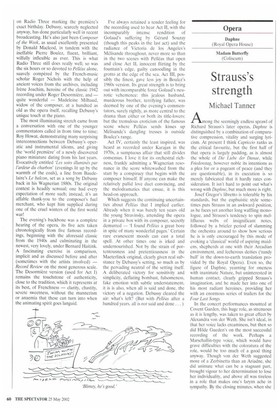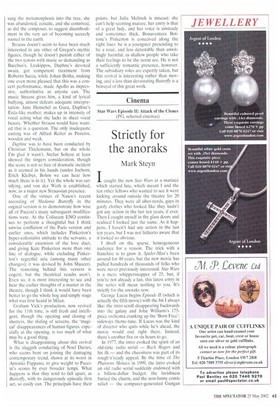Strauss's strength
Michael Tanner
Among the seemingly endless sprawl of Richard Strauss's later operas, Daphne is distinguished by a combination of comparative compression, vitality and surging lyricism. At present I think Capriccio ranks as the critical favourite, but the first half of that opera is largely padding, as is almost the whole of Die Liebe der Danae, while Friedenstag, however noble its intentions as a plea for or a pageant of peace (and they are questionable), in its execution is so merely fabricated that it hardly rates consideration. It isn't hard to point out what's wrong with Daphne, but much more is right.
Josef Gregor's libretto is tolerable by his standards, but the euphuistic style sometimes puts Strauss in an awkward position, as he faces yet another long waffling monologue, and Strauss's tendency to spin mellifluous webs of insignificant notes, followed by a briefer period of slamming the orchestra around to show how serious he is is only encouraged by this mode of evoking a 'classical' world of aspiring maidens, shepherds at one with their Arcadian environment, and lecherous deities ('randy bull' in the down-to-earth translation provided by the Royal Opera). Even so, the figure of Daphne, yearning for oneness with inanimate Nature, but uninterested in human contact, clearly gripped Strauss's imagination, and he made her into one of his most radiant heroines, providing her with an enormous series of trailers for the Four Last Songs.
In the concert performances mounted at Covent Garden, this huge role, as strenuous as it is lengthy, was taken to great effect by Alexandra von der Weth. She isn't ideal, in that her voice lacks creaminess, but then so did Hilde Gueden's on the most successful recording of the work. Perhaps a Marschallin-type voice, which would have grave difficulties with the coloratura of the role, would be too much of a good thing anyway. Though von der Weth suggested more of a Zerbinetta than an Ariadne, she did animate what can be a stagnant part, brought vigour to her determination to lose her individuality, and above all was tireless in a role that makes one's larynx ache in sympathy. By the closing minutes, when she sang the metamorphosis into the tree, she was abandoned, ecstatic, and she contrived, as did the composer, to suggest disembodiment in the very act of becoming securely rooted in the earth.
Strauss doesn't seem to have been much interested in any other of Gregor's mythic figures, though he doesn't punish either of the two tenors with music so demanding as Bacchus's. Leukippos, Daphne's devoted swain, got competent treatment from Roberto Sacca, while Johan Botha, making one even more pleased that this was a concert performance, made Apollo as impressive, authoritative as anyone can. The music Strauss gives him, a kind of lyrical bullying, almost defeats adequate interpretation. Jane Henschel as Gaea, Daphne's Erda-like mother, makes up in intensity of vocal acting what she lacks in sheer vocal beauty. Whether Strauss would have wanted that is a question. The only inadequate casting was of Alfred Reiter as Peneios, wooden and weak.
Daphne was to have been conducted by Christian Thielemann, but on the whole I'm glad it wasn't. Stefan Soltesz at least showed the singers consideration, though the score is not so free of dramatic incident as it seemed in his hands (under Jochum, Erich Kleiber, Bohm we can hear how much there is in it). Yet the whole was satisfying, and von der Weth is established, now, as a major new Straussian presence.
One of the virtues of Naxos's recent recording of Madama Butterfly in the orginal version is to demonstrate how wise all of Puccini's many subsequent modifications were. At the Coliseum ENO continues to perform a thoughtful but I think unwise conflation of the Paris version and earlier ones, which includes Pinkerton's hyper-colonialist attitude to the servants, a considerable extension of the love duet, and giving Kate Pinkerton more than one line of dialogue, while excluding Pinkerton's regretful aria (among many other changes); it was devised by John Mauceri. The reasoning behind this version is cogent, but the theatrical results aren't.
Even so, it is most interesting to see and hear the earlier thoughts of a master in the theatre, though I think it would have been better to go the whole hog and simply stage what was first heard in Milan.
Graham Vick's production, now revived for the 1 1 th time, is still fresh and intelli gent, though the opening and closing of shutters, the sliding of screens, the 'magical' disappearances of human figures, especially at the opening, is too much of what may be a good thing.
What is disappointing about this revival is the sluggish conducting of Noel Davies, who seems bent on joining the damaging contemporary trend, shown at its worst in Antonio Pappano, to give weight to Pucci ni's scores by ever broader tempi. What happens is that they tend to fall apart, as Butterfly, with its dangerously episodic first act, so easily can. The principals have their points. but Julia Melinek is miscast: she can't help seeming mature, her entry is that of a great lady, and her voice is unsteady and sometimes thick. Bonaventura Bottone's Pinkerton is conceived along the right lines: he is a youngster pretending to be a roué, and less detestable than unwittingly harmful, as shallow people who take their feelings to be the norm are. He is not a sufficiently romantic presence, however. The subsidiary roles are expertly taken, but this revival is interesting rather than moving, and a less than devastating Butterfly is a betrayal of this great work.























































































 Previous page
Previous page